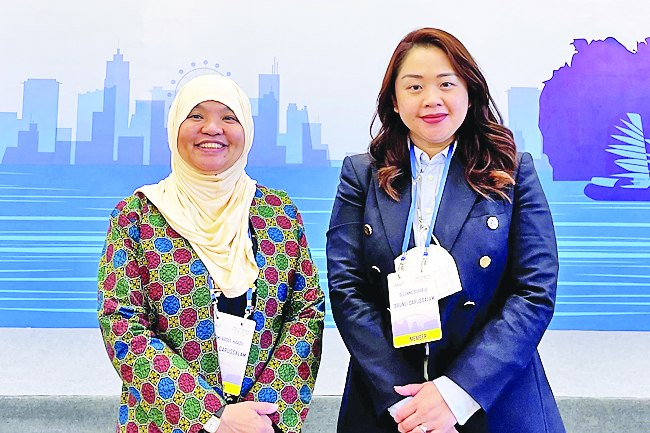Danial Norjidi
Business leaders in the Asia-Pacific Economic Cooperation (APEC) Business Advisory Council (ABAC) agreed on recommendations to address challenges, speed up the region’s economic recovery and regain the momentum for dynamic, sustainable, inclusive and resilient long-term growth.
During their third meeting this year, business leaders expressed deep concern about the unprecedented crises facing the region. The continuing pandemic, geo-political conflict, inflation and supply chain disruptions are standout issues directly impacting businesses, both large and small, and require greater leadership and decisive action from APEC, they said last week in Ha Long, Vietnam.
On the meeting, ABAC Brunei member and Chief Executive Officer of imagine Sdn Bhd Suzannawati binti Haji Suharju said it was “another productive ABAC meeting attended by our Brunei delegates. ABAC members agreed on a set of recommendations we will make to APEC leaders with the aim to accelerate recovery from the impact of the pandemic, inflation and supply chain disruptions”.
She added that ABAC Brunei contributed to shared work done and discussions on strong collaborative efforts needed to support micro, small and medium enterprises (MSMEs) through the adoption of foundational digital infrastructure, “as a means to ensure we remain resilient and sustainable for all”.
ABAC Brunei member and Executive Director at LVK Group of Companies Nik Hafimi binti Abdul Haadii said ABAC members must not only focus on driving the narrative as “the voice of business to APEC leaders”, but they must show urgency “within our recommendations as the regional and global economy responds to post pandemic recovery”.


“Challenges faced by MSMEs remain and as we look to guidance by APEC leaders, as members of the business community we must also do our part in sustainable collaboration and conscious attentiveness to inclusion for the under-served and under-represented,” she said.
In the statement, Vietnam President Nguyen Xuân Phúc said he looks forward to ABAC developing recommendations to address the grave challenges facing APEC economies, noting that Vietnam and other APEC economies have always appreciated and supported ABAC’s views in the past.
ABAC Chair for 2022 and Chairman of the Federation of Thai Industries Kriengkrai Thiennukul said, “At our meeting, ABAC members agreed on recommendations they will make to APEC leaders to confront these challenges by speeding up the region’s economic recovery and regaining the momentum for dynamic, sustainable, inclusive and resilient long-term growth.
“Our report to leaders will cover the key challenges of tackling inflation, confronting food and energy insecurity and addressing climate change.
“Over the medium term, we will call on APEC member economies to deepen regional economic integration by supporting the global rules-based trading system and accelerating the realisation of the Free Trade Area of the Asia-Pacific.”
He urged APEC to foster an enabling environment for recovery and growth through enhanced support for MSMEs, particularly women-owned and indigenous businesses, and the adoption of foundational digital infrastructure.
The chair also highlighted the importance of sustainability, saying businesses can contribute to develop innovative ideas on climate change and supporting the transition to a sustainable, resilient, and low-carbon economy for future generations – particularly the Bio Circular Green (BCG) Economy Model.
“All these actions are fundamental to ensuring that our region will be seamless, dynamic, resilient, and sustainable – and a place where everyone including disadvantaged and under-served groups can enjoy the benefits and opportunities offered by deeper regional economic integration.”
ABAC will present these recommendations to APEC economic leaders when they gather for their annual dialogue in Bangkok, Thailand on November 18.
ABAC will also convey business views in APEC ministerial and other high-level meetings covering food security, SMEs, women, health and the economy and finance.
The ABAC chair expressed his gratitude to all ABAC members, especially ABAC Vietnam, for hosting the in-person meeting, described as having reaffirmed ABAC’s intention to enable the resumption of business and cross-border travel, to learn to live with COVID-19, and to live in the “new normal”.



















































